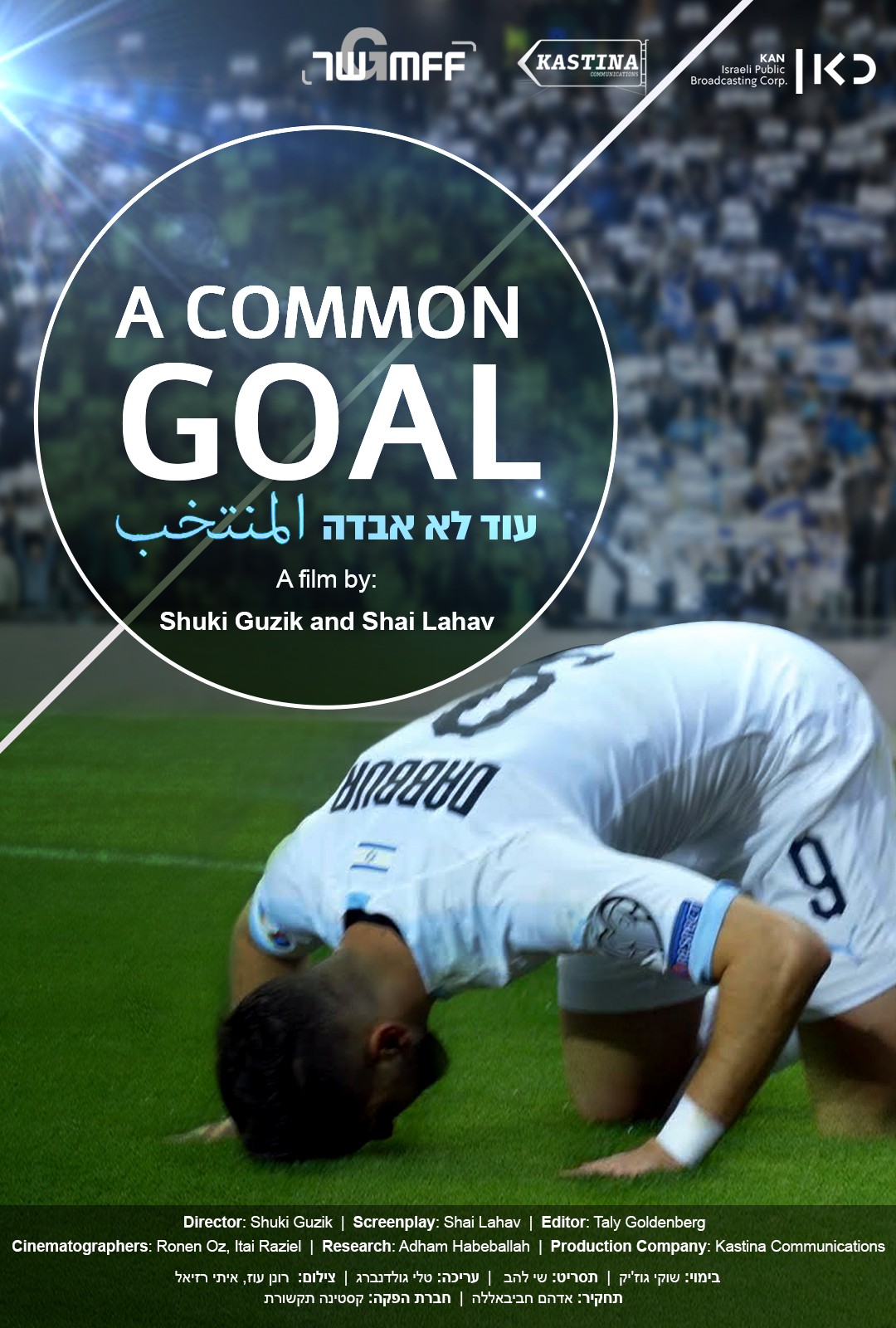Photo Credit: "A Common Goal" movie poster
‘A Common Goal’: Reconciliation through Sports
By Randy Pinsky
“I know that most Israelis are proud of me and support me…
But there are still those that can’t accept that a Muslim Arab player
does not sing the anthem, plays on the [Israeli National] team,
scores a goal and then prays.”
- Moanes Dabour, Arab-Israeli striker, Israeli National Soccer team
Things are changing in Israeli sports: while in past years, there had been an average of two Arab-Israeli players on the Israeli National Soccer team, in 2019 close to half identified as Arab.
How are they perceived by both the Jewish and Arab communities? What role can sports play in fostering cohesiveness in a divided country?
These questions and more were explored in the ‘A Common Goal’ documentary, followed by a discussion with the film's director Shuki Guzik and Azrieli affiliated faculty member Yakub Halabi on November 8.
Perceptions…and the Anthem
After fifty years of effort, the Israeli National Soccer team was at long last en route to the UEFA Euro 2020 qualifying tournament. With the team representing the state of Israel, the dynamics encountered in the broadcasting booths and in the stands are truly “a microcosmos to the whole Israeli-Arab story.”
While half the players identify as Israeli Arabs and proudly wear the Israeli jersey, there are strong reactions from the Jewish and Arab communities. Both sides express hope and admiration, believing this is emblematic of how Israel can and ought to be; a blend of cultures with sport as the great equalizer. For them, it is more about showcasing Israel on the world stage than caring about the athletes’ background.
For others however, it is a different story.
“Your every word and move are scrutinized because you’re not Jewish,” noted Arab-Israeli player Beram Kayal.
Most predominantly is the issue of the national anthem – or rather, the non-participation in it.
While the other players sing Hatikvah with the crowd, the Arab-Israeli players stand silently (if defiantly, some might say) by. When asked why they play for the Israeli team but refuse to take part in the anthem, the players explain it does not speak to them as it includes reference to ‘Nefesh Yehudi’ (‘Jewish soul’).
On the Arab side, the players are viewed as role models to aspire to...mixed with suspicion. In some Arab broadcasts, they are referred to as ‘Zionist footballers’ or ‘members of the Zionist team.’ These and other insinuations to their divided loyalties often result in them being labeled as “traitors” who are “rebelling against the Arab legacy”.
Athletic Skill Above All
In spite of such challenges, one cannot overlook the advances. For instance, while past games included a rushed Arabic synopsis at the end, now the entire game is broadcast in both Hebrew and Arabic. When asked, “Do you feel the team belongs to everyone?” members of the Arab community responded, “Yes, we’re all equal here - Arab, Jewish, Muslim, Christian - everyone’s the same…Inshallah [G-d willing] it should always be like this.”
While identity and politics play a role, at the end of the day it is athletic prowess that matters. Shlomi Barzel, head of communications for the Israeli Football Association, maintained, “The draft is professional. It’s not about being an Arab or not.”
Yet there is undeniably discomfort on both sides. While one accuses the players of being traitors, the other muses if missed goals were internal sabotage.
“Like everything in Israel, it’s complicated,” shrugged director Guzik. As one Arab-Israeli player concurred, “We Arab players in Israel are always in the middle and we get the heat from both sides.”
Double Meanings
In reflecting on the documentary, Guzik explained how he preferred the English title and play on words to the original Hebrew one. ‘A Common Goal’ refers both to striving to win for Israel but also, the united mission of peaceful cohabitation. The original Hebrew title is “Od Lo Avdah” or “[We] haven’t lost hope yet” (ironically a line from the Israeli national anthem that is the spark of much of the tension featured).
“[The] common goal also is trying to change Israeli society to make it more tolerant, one that has room for Arabs to integrate and be equal members of society,” observed Halabi.
“We are not there yet.”
Interestingly, the fact that the coach is European and Christian might be a factor in the make-up of the team. “Because he’s not Israeli or Jewish, I think he doesn't see the difference between the players,” observed Guzik. Halabi agreed, stating that he was perhaps exclusively goal-oriented and thus color-blind to background.
Hopes and Aspirations
So what message does this documentary provide about sports in Israel?
While there have been many hopeful advances in the world of sports through player diversity, there are also discouraging setbacks, such as the racist slurs expressed by both sides. Even gains such as having Arabic broadcasting might be more symbolic than substantial as the Arab community tends to prefer the Hebrew commentators.
But as the Hebrew title “[We] haven’t lost hope yet” evokes, sports have the potential to act as a medium for peaceful coexistence, with each goal scored and every forward pass made.



